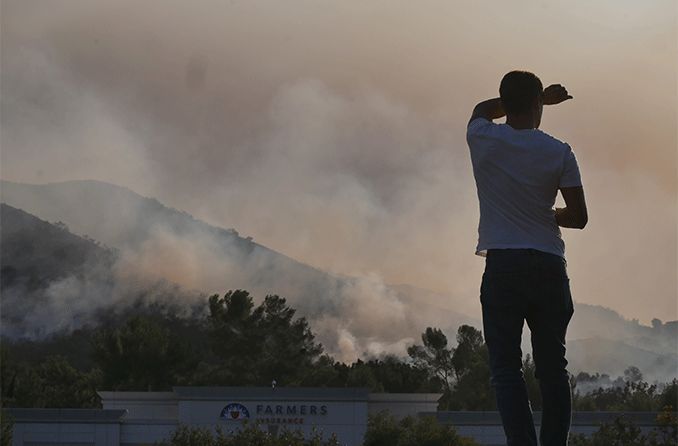Wildfire smoke and your eyes

It’s already been a record-setting year for destruction from California wildfires, and the state’s peak wildfire season (which typically runs from May through October) isn’t over.
As of August 17, 2021, record-setting wildfires had already ravaged more than 1.1 million acres of land in the country’s most populous state, according to the California Department of Forestry and Fire Protection (CAL FIRE).
By comparison, the 2020 California wildfires, which were historic in their own right, had only burned about 850,000 acres by mid-August.
In addition to the staggering cost and suffering these fires cause each year, wildfire smoke can be irritating and harmful to your eyes — even if you live many miles from the actual blaze.
How wildfire smoke affects your eyes
Besides the direct damage wildfires cause, they also dump tons of pollutants into the atmosphere. The ashfall and smoke from the fires is a toxic mixture of carbon, dust and particulates that’s harmful to the eyes as well as the respiratory system, according to a report published by the American Optometric Association.

Eye doctors say eye irritation triggered by wildfire smoke can include the following symptoms:
Grittiness
Temporarily blurred vision
Aggravation of dry eyes and eye allergies
Prolonged exposure to smoke can irritate anyone’s eyes. Fortunately, wildfire smoke typically doesn’t cause any significant or lasting vision problems.
READ NEXT: How climate may affect eyes and vision
How to protect your eyes from smoke
Dr. Gerami Seitman and Dr. Matilda Chan, ophthalmologists at UCSF Medical Center, and Dr. Vivian Shibayama, an optometrist at UCLA’s Jules Stein Eye Institute in Los Angeles, shared their advice for preventing and treating eye irritation caused by wildfire smoke:
Stay inside. If possible, stay indoors with the windows closed when outdoor air quality is poor.
Use an air purifier. While you’re inside, use an air purifier to decrease the presence of eye irritants.
Wear glasses, not contacts. Don’t wear your contact lenses, as they attract airborne particles from wildfire smoke.
Protect your eyes outside. If you’ll be spending a lot of time outdoors, wear wrap-around goggles to reduce exposure to wildfire smoke. Don’t have wrap-around goggles? Prescription eyeglasses or sunglasses can help block eye irritants.
Rinse your eyes. Wash away eye irritants with over-the-counter saline rinse or artificial tears. If you’re using artificial tears more than four times a day, stick with the preservative-free variety.
Try eye drops for relief. If itchy eyes are bothering you, try over-the-counter, itch-alleviating antihistamine eye drops.
Apply a compress. Place a cold compress to your closed eyes to help reduce itching.

Storing artificial tears in your refrigerator prior to use can add eye-cooling relief, according to the American Academy of Ophthalmology (AAO). Lying down with a cold compress over your eyes is also soothing, AAO says.
Also, be aware that barely visible ash and dust can remain in the air and irritate your eyes up to two weeks after visible smoke from wildfires has cleared.
When to see an eye doctor
If symptoms of eye irritation from wildfire smoke don’t go away after following the tips above, schedule a comprehensive eye exam with an optometrist or ophthalmologist.
During or after your exam, ask your eye care professional about safety glasses or goggles to shield your eyes from ash and smoke in the future.
READ NEXT: How can air pollution affect your eyes?
Page published on Tuesday, November 5, 2019






